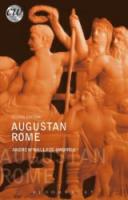
Bloomsbury (2nd edn., 2018) p/b 147pp £14.99 (ISBN 9781472534262)
This delightful little book does precisely what the title suggests. It gives an account of Rome under Augustus.
At the outset, the author addresses some of the problems which we face. First, no contemporary historian wrote an account of Augustus’ reign. The facts were so well known, that no-one troubled to record them. Paradoxically, there is a wealth of fine literature from the period, including Virgil, Horace and Livy. Some of the great Augustan monuments survive, including the Ara Pacis (an altar to celebrate that Rome was at peace). But the first ancient historian to provide a detailed narrative of Augustus’ reign was Cassius Dio, writing two centuries later.
The second problem follows from the first. It is unclear what the nature of Augustus’ imperium actually was. As Octavian, he claimed to be saving the Republic by defeating Antony at Actium, but in fact he subverted it. For the first three years, he assumed emergency powers. After that Octavian accepted the title of Augustus and other honours from the Senate; he held successive consulships and then proconsular powers, possibly with periodic renewals. These were traditional offices established under the Republic, but Augustus remained pre-eminent. His position as proconsul gave him command over legions posted in the provinces. He issued countless decrees and decisions, some of which survive. But none of those materials reveal what the great man’s imperium actually was.
The outstanding literature which defines the Augustan age was also highly effective propaganda. Virgil’s account of Aeneas’ shield, the prophecies which Aeneas hears when he visits the underworld, and Horace’s ode after the battle of Actium all celebrate the new world order. Each of the ‘great’ poets wrote in a similar vein. As the author shrewdly observes, ‘had they been mere propagandists for the regime, we would not be reading them today with such enthusiasm’.
Augustus took up residence in a fine mansion on the summit of the Palatine Hill. That choice of location was symbolic. In mythology, it was where Romulus had planted the nucleus of the city. Senators and the ancient noble families owned mansions along the roadway leading up to the summit. Although nominally they had been restored to their traditional republican roles, in reality they had become courtiers to an Emperor. In the Metamorphoses at 1.168-176, Ovid describes the abode of the gods in a passage which everyone would have recognised as describing the Palatine Hill.
As W-H. points out, Augustus’ domestic arrangements were designed to reinforce his authority. He had ready access to the forum. His house was directly linked to the new temple of Apollo. That temple was dedicated in 28 BC as a thank offering for the victory at Actium. It was the venue where Augustus received foreign embassies and summoned meetings of the Senate.
The author provides a vivid account of the struggles within Augustus’ extended family. In summary, there were three phases: a first period, when Octavia (Augustus’ sister) was dominant; a middle period of rivalry between Julia (Augustus’ daughter) and Livia (his third wife); a late period, after the banishment of Julia, when Livia dominated. It was her son, Tiberius, who eventually succeeded to the top job.
Chapter 4, ‘Golden Rome’, is an account of the major re-building of the city which Augustus oversaw during his 45 years in power. He famously claimed to have found Rome built of brick and left it as marble (Suetonius, Augustus 28). The building works included numerous temples, the reconstruction of the forum and many monuments to himself. All this was not simply an exercise of vanity. Because of the spectacular conquests by Julius Caesar and Pompey, Rome had suddenly become the hub of a vast Empire, stretching across most of the known world. It needed to project the image of an imperial capital.
As an administrator, Augustus divided Rome into fourteen regions. He set up a fire brigade based at seven fire stations and a police force, known as the Urban Cohorts. He also established the Praetorian Guard, a formidable military unit, to protect himself.
Augustus promoted religion and morality as powerful forces to bind society together. The Leges Juliae of 18 BC provided incentives for marriage and child bearing. They also imposed severe penalties for adultery. Augustus organised the Secular Games in 17 BC to mark the arrival of a new golden age. Ironically, his own family did not live up to the requisite high standards. He ended up banishing both his daughter and granddaughter for sexual misconduct. In an intriguing final chapter, the author discusses the Messiah image which Augustus projected. He points to possible links between the writings of Isaiah and Virgil.
The main body of the work is essentially the same as in the first edition. But there is a revised introductory chapter and an additional chapter at the end. The new final chapter reviews the legacy of Augustus and the secret of his success. In a nutshell, ‘he made sure that life was good for Roman citizens’ (p. 135).
This is a fascinating book, eminently readable and only seven chapters. Everyone with an interest in the classics will enjoy it.
Rupert Jackson
